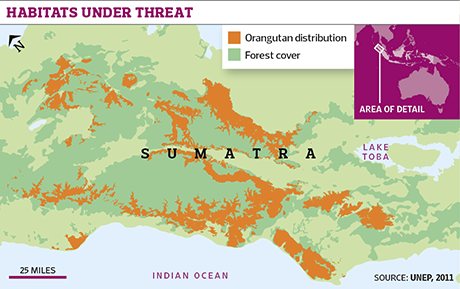Alas, these 2 countries are mega-producers of palm oil. Indonesia is the world's largest palm oil producer with 6 million hectares of palm oil plantations (Benson, 2014), while Malaysia is the world's largest exporter of palm oil. Found in a wide range of products and also an alternative source of energy via palm oil biodiesel, future demand for palm oil in the food and energy sector is expected to increase drastically. And here lies the tension: while viewed as a serious ecological threat to environmental groups, the food industry glorifies palm trees as a wonderful plant that yields oil far greater then other plants such as sunflower.
With rising demand for palm oil, this spells trouble for orangutans - a species closely-related to us. Orangutans tend to inhabit lowlands, but that is also where land is most fertile and suitable for palm oil plantations (Marshall, 2013). Hence, large land-clearing in Indonesia and Malaysia has lead to a competition for land between humans and orangutans. From the picture below, it is evident that land area covered by orangutans largely overlap with forested precincts that are vulnerable to land-clearing for palm oil plantations. Over the years of excessive deforestation, large habitat areas of orangutans have been lost, resulting in fewer than 60,000 orangutans remaining in the wild forests of Sumatra and Borneo today (Chamberlain, 2013).
 |
| PHOTO: UNEP, 2011 |
 |
| ORANGUTANS. PHOTO: ONEKIND.ORG |
The Roundtable for Sustainable Palm Oil (RSPO) was established in 2004 by WWF, and aims to involve retailers, palm oil producers, food manufacturers and policymakers from different countries to encourage adoption of safe and sustainable methods for Palm Oil plantation sites (Schouten & Glasbergen, 2011). The RSPO has had relative success since then, with 1000 members at present (UCS, 2013).
 | |
| PHOTO: RSPO |
In 2011, RSPO released a brand new trademark label (picture on the left) that can be used on product packaging of member companies. Producers of household products such as peanut butter, margarine and cookies will be accredited with this trademark once these companies fulfill the requirements set out under RSPO's "Principles and Criteria" framework.
It is corporate responsibility to adopt sustainable practices to minimise impacts of palm oil plantations on orangutans. Thus, the introducing of this trademark should incentivize companies to change their environmental-degrading practices, and adopt a more sustainable approach.
While it is impossible and impractical to halt palm oil production altogether (it is a major source of revenue for Malaysia and Indonesia), at least the new methods and techniques proposed by the RSPO are less harmful.
Additionally, Indonesia's government has also taken action by imposing a moratorium on clearing additional areas of rainforests for palm oil plantations in May 2011. Despite outrage from domestic palm oil industries, the ban was extended, and will last until at least 2015 (McClanahan, 2013). This is heartening news for us, as it shows that the government is serious about protecting wildlife habitats of orangutans and other endangered species found in the rainforests of Indonesia.
Next time you shop for groceries, try to avoid products with palm oil, or purchase products that may have the "Certified Sustainable Palm Oil" trademark label. The orangutans will thank you for that! And remember, it is not the crop that should have a negative connotation, but the environmentally-detrimental way it is being cultivated.
Literature Cited
Benson, T. (2014). Major palm oil companies to halt deforestation. UPI [ONLINE] 21 September. Available at: http://www.upi.com/Science_News/2014/09/21/Major-palm-oil-companies-to-halt-deforestation/2501411326608/. [Accessed 30 September 14].
Chamberlain, G. (2013). Orangutans fight for survival as thirst for palm oil devastates rainforests. The Guardian.[ONLINE] 30 September. Available at: http://www.theguardian.com/world/2013/dec/15/orangutans-fight-for-survival. [Accessed 30 September 14].
David, L. A. G., Serge, W., Justin, E., Daniel, J., Markku, K., & Nigel, L.-W. (2009). The future of forests and orangutans ( Pongo abelii ) in Sumatra: predicting impacts of oil palm plantations, road construction, and mechanisms for reducing carbon emissions from deforestation. Environmental Research Letters, 4(3), 034013.
Schouten, G., &
Glasbergen, P. (2011). Creating legitimacy in global private governance:
The case of the Roundtable on Sustainable Palm Oil. Ecological economics, 70(11), 1891-1899.
Marshall, M. (2013). Unlikely alliances are key to saving orang-utans. New Scientist, 220(2939), 27.
McClanahan, P. (2013). Can Indonesia increase palm oil output without destroying its forest? The Guardian. [ONLINE] 11 September. Available at: http://www.theguardian.com/global-development/2013/sep/11/indonesia-palm-oil-destroy-forests. [Accessed 30 September 14].
Nater, A., Arora, N.,
Greminger, M. P., van Schaik, C. P., Singleton, I., Wich, S. A., ...
& Krützen, M. (2013). Marked population structure and recent
migration in the critically endangered Sumatran orangutan (Pongo
abelii). Journal of Heredity, 104(1), 2-13.
Union of Concerned Scientists (2013). Palm Oil and Tropical Deforestation. UCS [ONLINE] 12 October. Available at: http://www.ucsusa.org/global_warming/solutions/stop-deforestation/palm-oil-and-forests.html. [Accessed 30 September 14].
No comments:
Post a Comment